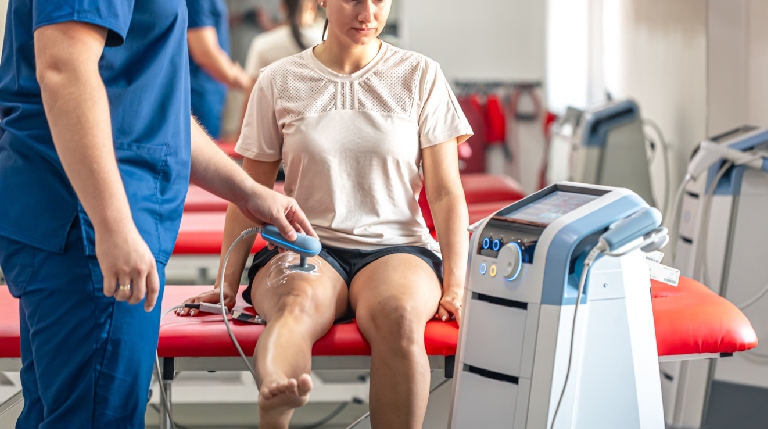Undergoing Total Knee Replacement (TKR) is a substantial step towards resolving chronic knee issues and enhancing life quality. However, the surgery is just the beginning of a patient’s journey towards full recovery. Physiotherapy is a critical aspect of this journey, often overshadowed by the surgery. This comprehensive exploration seeks to illuminate why physiotherapy is indispensable after TKR, elucidating its contributions to successful rehabilitation and long-term knee functionality.
Accelerating the Healing Process
A Swift Road to Recovery:
Post-operative physiotherapy significantly hastens the healing process. Tailored to individual needs, physiotherapy regimens are designed to incrementally boost knee strength and mobility, ultimately shortening the recovery period.
Effective Strategies:
Physiotherapists employ an array of exercises and techniques carefully calibrated to the patient’s specific surgical outcomes and general health status to ensure safe and rapid recovery.
Enhancing Mobility and Flexibility
Restoring Range of Motion:
Regaining a full range of motion in the knee joint is essential post-TKR for performing daily activities efficiently. Physiotherapy plays a vital role, with exercises to improve flexibility and joint movement.
Customised Exercise Plans:
These plans are not one-size-fits-all; they are meticulously formulated based on individual assessments and progress, ensuring the knee regains its optimal range of motion.
Strengthening the Knee and Surrounding Muscles
Supporting the New Joint:
Strong muscles around the knee are crucial as they provide support and stability to the new joint. Physiotherapy includes a focus on strengthening these supporting muscles.
Long-term Stability:
This muscular reinforcement not only aids in the immediate recovery phase but also contributes to the long-term success and stability of the knee replacement.
Alleviating Pain and Reducing Inflammation
Post-operative Discomfort Management:
One of the immediate benefits of physiotherapy is its effectiveness in managing post-operative pain and swelling. Techniques like cryotherapy, heat therapy, and electrical stimulation play a significant role.
Ensuring Comfort During Recovery:
The goal is to make the recovery process as comfortable as possible, allowing patients to participate actively and confidently in rehabilitation exercises.
Minimising Scar Tissue Formation
Battling Fibrosis:
Excessive scar tissue formation post-surgery can limit mobility and cause discomfort. Physiotherapy helps in preventing the build-up of such fibrosis around the knee joint.
Ensuring Smooth Movement:
Through regular movement and specific exercises, physiotherapists help maintain the knee joint’s flexibility, which is essential for smooth, pain-free movements.
Improving Gait and Balance
Relearning to Walk:
Post-TKR, patients often need to relearn walking patterns. Physiotherapy focuses on retraining these patterns, ensuring the development of a balanced and efficient gait.
Preventing Falls and Injuries:
Improving balance and coordination through physiotherapy is critical in preventing falls and other injuries, especially in the initial stages of recovery.
Educating Patients for Long-Term Care
Empowering with Knowledge:
An often overlooked aspect of physiotherapy is patient education. Physiotherapists provide valuable insights into joint care, activity modifications, and techniques to prevent future common problems.
Promoting Self-Management:
Educational sessions about self-care strategies post-surgery enable patients to take an active role in their long-term joint health.
The Indispensability of Physiotherapy Post-TKR
A Non-Negotiable Aspect of Recovery:
While some may wonder if physiotherapy can be skipped, its role in recovery is non-negotiable. Without it, the chances of full recovery, regaining complete functionality, and avoiding long-term complications diminish significantly.
Tailored to Individual Needs:
The extent and nature of physiotherapy required vary from patient to patient, depending on several factors, including age, overall health, and the specificities of the surgical procedure.
Dr Yugal Karkhur on Post-TKR Physiotherapy
Dr. Yugal Karkhur, a prominent figure in orthopaedic surgery, underscores the necessity of physiotherapy following TKR. His patient-centric approach extends beyond surgery, ensuring that each individual under his care has a comprehensive physiotherapy plan. This not only aids in rapid recovery but also sets the foundation for a return to an active, fulfilling lifestyle. His dedication to integrating advanced surgical techniques with robust post-operative care highlights his commitment to holistic patient wellness.
In conclusion, physiotherapy after Total Knee Replacement is not just a supplementary treatment but a fundamental component of the healing process. It ensures that the efforts put into surgery yield the best possible outcomes, paving the way for patients to enjoy a renewed, active life.Disclaimer: The content of this blog is intended for educational purposes and should not be considered a substitute for professional medical advice. For personalised healthcare recommendations, please consult a specialist physician. The results of treatments vary from person to person.

